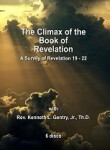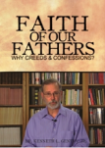VOS ON 2 CORINTHIANS 5 (Part 3)
PMW 2023-053 by Geerhardus Vos
Gentry Introductory Note:
I am continuing a three-part presentation of Geerhardus Vos exegesis of 2 Corinthians 5. He wrote this in opposition to the arising of the new (in his time) liberal view that Paul’s theology changed over time. He originally believed in a physical resurrection of the dead, but eventually began to believe that at the moment of death believers received their new resurrection body as a spiritual body. This is the third and concluding article in the series. Now to Vos’ argument.
VOS’ PRESENTATION CONCLUDED
The difficult verse 3. We must now look for a moment at the passage as a whole, and in connection with this at the difficult verse 3. We do this in order to grasp the import of the entire section, and thus to gather in the fruit of our somewhat laborious exegesis. The passage connects with 2 Corinthians 4:17–18 by means of “for” (gar): “For we know that in case our earthly tent-house shall have been dissolved, we have a building from God,” etc. In 4:17–18 the “affliction” in the body works out an eternal weight of glory. This is likewise to be enjoyed in the body, since there, in the body, the “affliction” was borne. The future body thus appears from the outset as the bearer of an eternal weight of glory. The knowledge that such a new body shall be ours is basic for the hope of possessing and enjoying the certainty of this eternal glory. Without such a center the glory could not exist. Especially the description of this new body as a “house” admirably fits into this train of thought, because a house is not a mere place of shelter, but has attached to it the aesthetic conception of a center of manifestation for the glory of its inhabitant.
The next verse joins to this, by means of kai gar (“and for,” i.e., “for indeed”) as a further basis of the conviction expressed in the “we know” of verse 1, the circumstance that “we groan desiring to be clothed upon with our habitation from heaven. [1] Such an ardent, groaning longing affords a particularly strong ground for the assurance that a heavenly body must be appointed for us. This would not follow, of course, if the longing were of the nature of a purely-subjective sentiment or aspiration. In the present case it does follow, because, being worked in the believer by the Spirit, it becomes divinely prophetic of what is actually in store for him. The idea is that the Christian eagerly desires the succeeding of the heavenly body, if possible, without the intervening of any period of bodiless existence, so as to justify the conclusion that the Spirit’s hand is discernible in this.
The ardency and eagerness of the desire are guarantees of its divine origination. Paul continues, “in this we groan.” Some render by “in this (tent)” referring back to verse I. This construction is somewhat favored by verse 4 where the same thought is expressed as follows: “for we that are in this tent do groan.” It is quite possible, however, to render: “in this respect we groan, that we long to be clothed upon.”
 The Climax of the Book of Revelation (Rev 19-22)
The Climax of the Book of Revelation (Rev 19-22)
Six lectures on six DVDs that introduce Revelation as a whole, then focuses on its glorious conclusion. Provides an important, lengthy Introduction to Revelation also.
See more study materials at: www.KennethGentry.com
The foregoing brings us to the difficult verse 3. There are two points of uncertainty in the reading of this verse: (1) The conjunction introducing the sentence is in some MSS. ei ge (“if indeed,” or ei ge kai, “if indeed also”) and in others ei per (“if,” with the intensive particle)h. (2) The participle following this conjunction is read in some authorities endusamenoi (“be clothed”) in others ekdusamenoi(“put off clothing”). The evidence seems to be in favor of ei ge kai endusamenoi ou gumnoi eurethsometha (“if indeed also we shall be clothed and not found naked”). But it is extremely difficult, on any view taken of the passage as a whole, to fit these words into the context with an intelligible result.
The modern exegesis above criticized would take it as follows: the verse assigns the reason for the longing to be clothed upon at death. That is, having put the (new) body on we shall not then be found naked. For in that case there will be no interval of disembodied existence. So far as thought is concerned, and taken by itself, this would yield appropriate sense. The fatal objection to it is that it takes endusasthai in the same sense as belongs specifically to ependusasthai. Now the latter is used in verses 2 and 4 with pointed emphasis upon the epi, so as to compel the express understanding that it is not identical with endusasthai. Rather it is its opposite, if not in result, yet surely in method of procedure.
This being so, we may say that Paul, in order to express the thought attributed to him by this new exegesis, would in all likelihood have repeated the word ependusasthai in its participial form. He would have said “we long to be clothed upon, since having been clothed upon we shall not be found naked.” The verb which has but one prepositional prefix is distinguished from the doubly compound one in this very vital respect. It does not imply the guarantee for the avoidance of “nakedness,” inasmuch as it does not fix the point for the “putting on” as coinciding with the moment of death. We are bound, therefore, to take endusamenoi as different from ependusamenoi.
But what the clause means, if the distinction be insisted upon, as we believe it must, appears difficult to tell. Under these circumstances we prefer, we should not wrestle with the text in order to extract from it some sort of meaning, such as will at best induce half-acceptance. Rather we must see how far the difficulty admits of relief by adopting the other reading with ekdusamenoi (“put off clothing”) instead of endusamenoi (“be clothed”). [2] With this when combined with either ei ge kai or ei per (“although”), we can reach comparative clarity. There should be but one warrant always for changing the text, either by pure emendation, or through adoption of some other, perhaps less-strongly attested, reading. And that is the discovery that the adopted modification suddenly lets in light where before darkness prevailed. Such is the case here. Ei ge kai ekdusamenoi yields “if so be that also, having put off this body (i.e., having died), we shall not in the end be found naked, our “being clothed upon” taking place at the general resurrection. Taking the other conjunction ei per, we obtain the following rendering: “although even having put off this body (died) we shall not ultimately be found naked.”
Verse 4 takes up verse 2 again, elaborating further the same thought there expressed, whence in the same manner the verse is introduced by kai gar (“for also, for indeed”). The groaning here is caused by uncertainty as to the how or when. Nevertheless, it conveys assurance so far as the simple fact of ultimate attainment is concerned. The “being burdened” here by no means excludes the “we know” of verse 1, as it would do on the modern interpretation.

Faith of Our Fathers (DVDs by Ken Gentry)
Explains the point of creeds for those not familiar with their rationale.
Also defends their biblical warrant and practical usefulness for defending historic, Christian orthodoxy in our heterodox world.
See more study materials at: www.KennethGentry.com
Returning to verse 5. In connection with verse 5 we encountered a difficulty, left for the time to one side. Here is the place to consider it. It consisted in the problem, how the “this very thing” could be referred to the immediately preceding “clothed upon”? [3] How could Paul so objectively affirm that God had purposed and prepared him and his readers for “being clothed upon,” if at the same time he continued in uncertainty, as to whether he was to attain it or not? That for which God prepares believers can scarcely be considered a matter of doubt. And conversely, if the point was subject to doubt, Paul could scarcely affirm that God had prepared him and the others for it.
We suggested at the previous point a removal of the difficulty by making “this very thing” refer back not to the immediately preceding “clothed upon,” but to the general thought dominating the whole preceding context. And the thought is that in one way or another the Christian is sure to obtain a new body. The question remains, however, whether “this very thing” is not too pointed and emphatic for reference to this general idea. For this reason we now offer for consideration the reference of these words not to the “being clothed upon,” but to “we groan.” The “groaning” is on this view taken as the very thing for which God has prepared the believer. He causes it to issue from his heart, from whence also it has a prophetic significance. It thus becomes a confirmation of the assurance that he shall obtain the heavenly body.
FOOTNOTES
1. Kai gar is stronger than the simple gar: “for verily.”
2. Of course, it is not impossible for a skillful exegete, who finds himself in an impasse of this kind, to extort from the text some tolerable sense. He may do so by sacrificing all naturalness of expression to the one desire of making the words say anything at all. As an example of this sort of exegesis the following might be offered: We long to be clothed upon through reaching the parousia alive. Thus we would avoid the interval of nakedness, since also, after having “put on” at that point, we shall not henceforth be found naked at our entrance upon the eternal state. In other words, such is our ultimate destiny in any event. We may have to attain it through death, and subsequent nakedness and the ultimate putting on of the body, rather than by instantaneous putting of the new over the old. Nevertheless, we cannot help continue longing for the pre-death parousia-investment, because that reaches the eventual goal in the shortest and easiest manner. This exegesis, it will be perceived, separates kai (“and”) from the ei ge (“if indeed”) and joins kai closely to endusamenoi (“being clothed”). It certainly is ingenious; but is it not too ingenious to invite confident acceptance?
3. The difficulty here considered is, it will be observed, a difficulty which the old and new exegesis equally encounter. Both must admit that in v. 4 Paul expresses a doubt, and seek some reconciliation with the “we know” of v. 1.
THE TWO AGES AND OLIVET (advertisement)
I am currently researching a study of the Two-Age structure of redemptive history. My starting point is based on the disciples’ questions to Jesus in Matthew 24:3. Much confusion reigns among those unacquainted with the Two-Age analysis of history, which was promoted by Jesus (Matt. 12:32; Mark 10:29-30) and by Paul (Gal. 1:4; Eph. 1:21). The Two Ages are not the old covenant and the new covenant, but world history since the fall and the consummate order following the Second Coming and the Final Judgment.
If you would like to support me in my research, I invite you to consider giving a tax-deductible contribution to my research and writing ministry: GoodBirth Ministries. Your help is much appreciated!
Kenneth L. Gentry Jr.'s Blog
- Kenneth L. Gentry Jr.'s profile
- 85 followers



